Published on August 17, 2019
The Vision of Tata Business Excellence Group (TBExG) is “To Partner with Tata Companies in their Journey of Excellence to Achieve World Class Performance”. Towards accomplishing this Vision, TBExG engages with Tata Group companies through interventions such as TBEM Assessments and Deep Dive Assignments in specific functional areas such as Customer Centricity, Operational Excellence, Strategy Deployment, Human Resources and Safety.
Maturity Models
TBExG has developed several Maturity Models to assess the level at which an organization is operating in different functional areas. These results are then used to map the progress of the organization on its journey of excellence and benchmarking their maturity, against global standards and identifying the key improvements that are required. The Maturity Model frameworks are based on CMMI (Capability Maturity Model Integration) which help organizations quickly understand their current level of capability and performance in the context of their own business objectives and compare themselves to similar organizations. These models enable TBExG consultants to peg organizations on a 5-point scale (as shown below), and provide companies with specific action items to move to the next level.
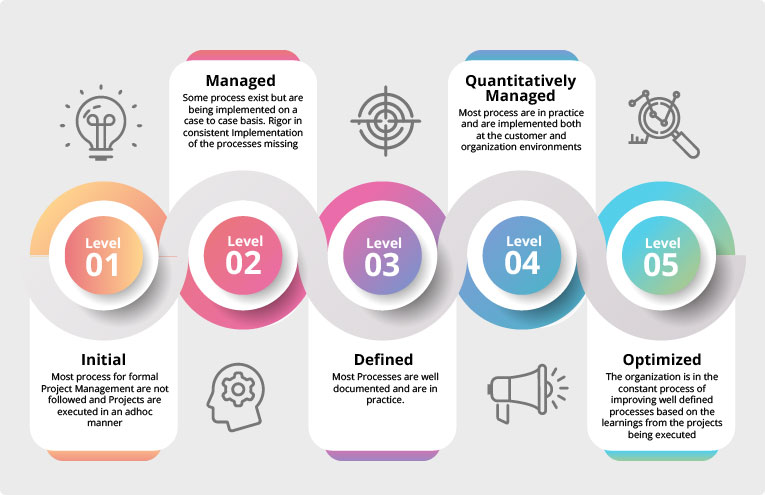
TBExG's Proprietary Maturity Models are developed for use in the following areas:
- Voice of the Customer (VoC)
- Competitive Intelligence (CI)
- Knowledge Management (KM)
- Project Management (PM)
- After Sales Service
- Key Account Management (KAM)
Methodology used
Each maturity model is implemented through a project as shown below. At the end of the maturity assessment, a report is generated which provides:
- The maturity level as a number out of 5 (overall and dimension wise)
- Recommendations to move to the next maturity level
- Best practices within the Tata group and externally, which could be adopted to improve the process maturity.
If required, TBExG also engages in interactions with global experts on the subject matter through its partnerships with organizations such as APQC (American Productivity and Quality Center), ASQ (American Society for Quality) and SCIP (Strategic and Competitive Intelligence Professionals). The outcome of these maturity assessments is also often used as an important input to a larger study.
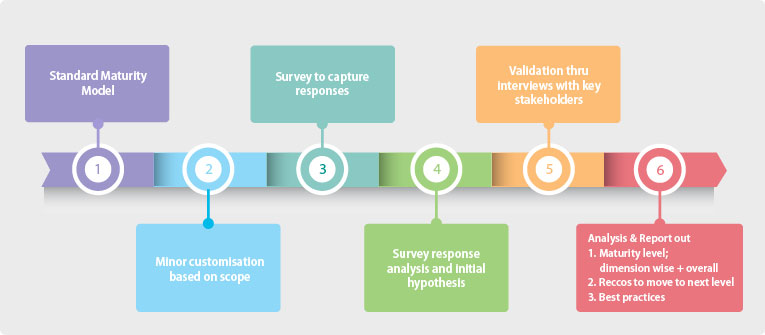
Glimpses of Maturity Models used across the Tata Group
The company is a provider of global digital infrastructure service provider and was struggling with the use of various Customer listening mechanisms which lacked standardization and agility across geographies. TBExG’s VoC Maturity Model proved to be an appropriate diagnostic tool to use in this case. First, the effectiveness of various listening channels currently used and the reasons for gaps in acting and close looping with customers, were evaluated. Once the findings were collated, the team presented solutions based on best practices on an agile and standardized VoC program structure, maintaining a standardized Global Data repository and other enablers for effective customer listening. The recommended solutions were discussed with various stakeholders and there was high acceptance by the leadership team. Key Initiatives have been prioritized and taken up for implementation by the company. Below are the VoC parameters studied as part of this project.
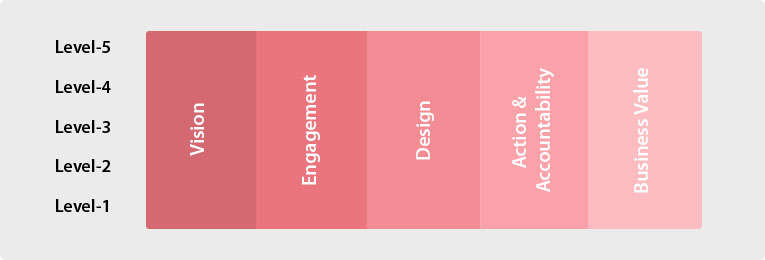
Tata Steel is facing competition from manufacturers who are increasing capacity either via expansion or acquisition, as the industry is getting a strong boost from the Indian government. Such a dynamic business environment led Tata Steel to partner with TBExG in setting up a CI Program as part of its Corporate Strategy initiative. The objective of the project was to set up a structured process to track the competitive landscape on a continuous and proactive basis and to ultimately intertwine Competitive Intelligence with its Strategy development and deployment process. The assignment was divided into 2 phases, where Phase 1 consisted of understanding the company’s Competitive Intelligence initiatives, through surveys and interviews. Phase 2 was about the implementation of the CI framework and strengthening the CI process through digital enablement so that the CI process works on a continuous basis and remains dynamic and relevant. Tata Steel was given actionable recommendations to implement in the short, medium and long term that covered the structure, sizing of team and processes of a traditional of CI framework. The company agreed that the output provided by TBExG was very comprehensive and they were confident that the specific recommendations would make the CI process continuous, robust and systematic. Below are the parameters on which the company’s competitive intelligence processes were assessed.
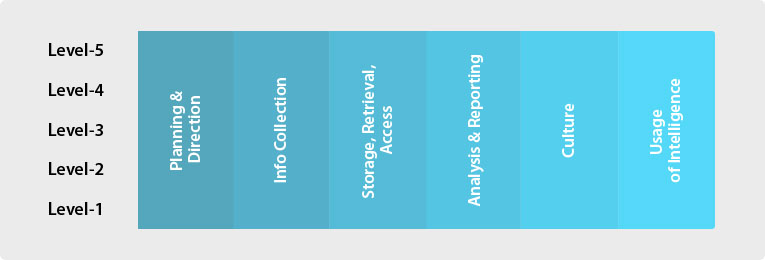
Tata Elxsi agreed to carry out a Maturity Assessment of its CI initiatives, in order to identify the level at which it was tracking and monitoring strategic and tactical moves of its key competitors as well as the overall competitive landscape. The aim of the assignment was to identify areas that would help the company improve its performance vis-à-vis competition in a proactive manner. TBExG conducted a CI Maturity Model evaluation which consisted of multiple steps spread across a 5-week period. The final output consisted of actionable recommendations that they could be implemented in the short and long term, in order to move to the next level of CI maturity. Six months after the project, TBExG was pleased to learn that several of the recommendations made to Tata Elxsi had been implemented. Below are the parameters on which the company’s competitive intelligence processes were assessed.

Tata Global Beverages (TGB) approached TBExG to help them evaluate existing KM approaches and identify areas for systematic knowledge sharing and transfer within specific functions and geographies. The key areas where the company felt there was significant room for the improvement were launches of new products by incorporating learnings from past launches, and commercial & sales functions, and by utilizing tacit knowledge residing in Tea/Coffee buying and blending teams. TGB engaged TBExG to help them build and design a knowledge management framework and roadmap. With the use of TBExG’ s proprietary model, and APQC’s KM Capability Assessment framework, TBExG evaluated different aspects of TGB’s KM program. Several case studies from within the Tata Group and external companies were presented to the management team which emphasized the value and impact that a well-structured KM framework can deliver. Below are the parameters used in the KM Maturity Assessment Model.
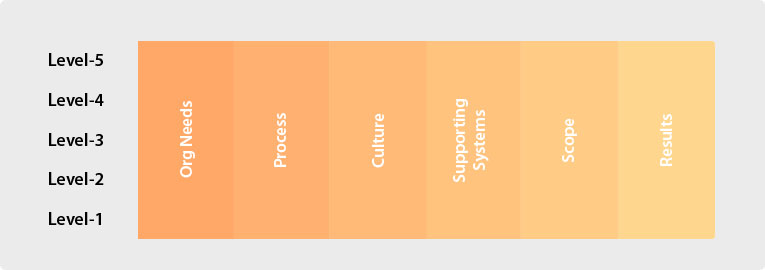
TBExG has also developed additional Maturity Models in the areas of After Sales Service, Project Management and Key Account Management (KAM). To know more about how these Maturity Models can be leveraged for your company, please connect with Vinod Kumar at vinodkumar@tata.com.


